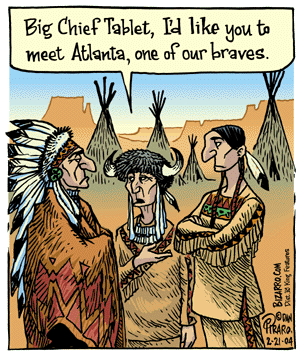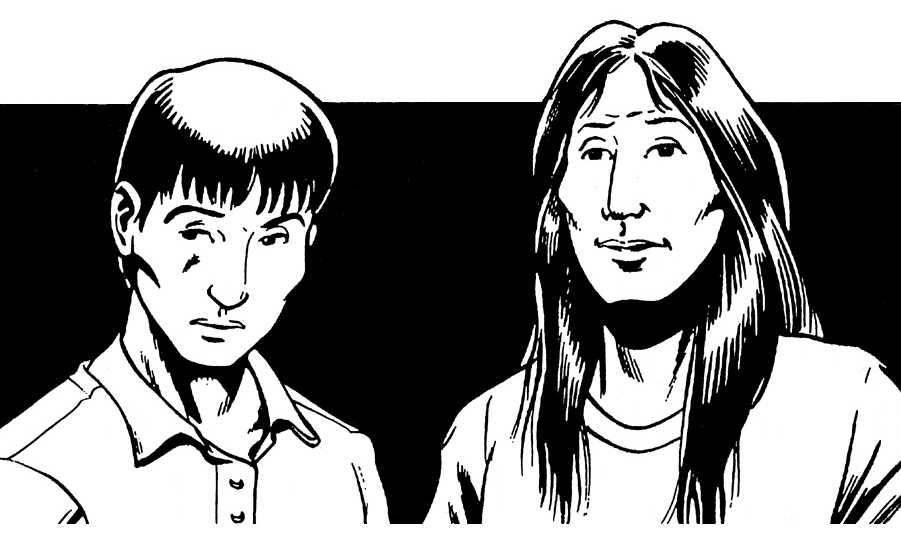
 An excellent posting from Kai Chang on the subject of political correctness:
An excellent posting from Kai Chang on the subject of political correctness:

 An excellent posting from Kai Chang on the subject of political correctness:
An excellent posting from Kai Chang on the subject of political correctness:
It's axiomatic that good writing tends to avoid clichés, because clear thinking is a fresh response to living reality, not a tired repurposing of brittle brain-crust. A logical inverse to this axiom is that political commentary tends to brim with toxic portions of vapid clichés, because good writing is about as widespread in today's political discourse as it is in corporate accounting memos.
The blogosphere has its own style of cyber-fad clichés, slightly more high-handed than the stentorian pap of talking-head TV, and occasionally more illuminating. Two examples that leap to my mind are the inescapable utterances of "schadenfreude" and "kabuki", expressions whose exoticism appears to elevate their usage to haute-cliché à la William Safire. No matter what political controversy is being discussed these days, you're likely to run across bloggers busting out these 3-syllable badges of faux-erudition with about as much linguistic adroitness as tap-dancers on stilts.
However, there's one political cliché so popular, so omnipresent, so densely far-reaching, that it is without doubt the greatest cliché of our time. It is the One Cliché to rule them all: "political correctness" and its variants. What's striking about the repetitive droning complaints about "PC" (from both conservatives and liberals) is that the expression itself, and the concept it invokes, is as sloppily unexamined as it is pedestrian.
The phrase "politically correct" can be used in two distinct ways: either with its original literal meaning, or with the mocking sarcasm that's common these days. I'll get to the former in a moment, but I'll begin with the latter. As it's commonly used, "PC" is a deliberately imprecise expression (just try finding or writing a terse, precise definition) because its objective isn't to communicate a substantive idea, but simply to sneer and snivel about the linguistic and cultural burdens of treating all people with the respect and sensitivity with which they wish to be treated. Thus, the Herculean effort required to call me "Asian American" rather than "chink" is seen as a concession to "the PC police", an unsettling infringement on the free-wheeling conversation of, I suppose, "non-chinks". Having to refer to black folks as "African Americans" rather than various historically-prevalent epithets surely strikes some red-blooded blue-balled white-men as a form of cultural oppression. Having to refer to "women" rather than "bitches" lays a violent buzzkill on the bar-room banter of men preoccupied with beating on their chests and off other body parts.
Obviously these examples fall on the simplistic side of things, but I think they illustrate the shaky philosophical foundation of today's usage. Underlying every complaint of "PC" is the absurd notion that members of dominant mainstream society have been victimized by an arbitrarily hypersensitive prohibition against linguistic and cultural constructions that are considered historical manifestations of bigotry. It's no coincidence that "PC"-snivelers are for the most part white men who are essentially saying, "Who the hell do these marginalized groups think they are to tell me how I should or shouldn't portray them? I'm not going to say 'mentally challenged' when it's my right to say 'retard', goshdarnit there's only so much abuse I'll take!"
In this context, the conceit that "political correctness" constitutes a violation of free speech is particularly zany; as though society's marginalized groups wield oppressive power over the dominant mainstream. Actually, as far as I'm concerned you're free to call me "chink" and I'm free to call you "moronic racist loser" (and more if necessary, but I'll leave that aside for now in the interest of false civility). Free speech is the straw man of choice for intellectual bums of all stripes too fragile and vacuous for critical engagement. Calling someone who says or does bigoted things "a bigot" isn't censorious, it's descriptively accurate, like calling a bad movie "a bad movie", even if the bigot didn't intend to come off as bigoted and the movie didn't intend to come off as bad.
As for the original literal meaning of "PC", the phrase is believed to have emerged from China (seriously, I'm not making this up) during the reign of Marxist-Leninist-Maoist thought. Revolutionary leaders unironically applauded words and actions as "politically correct" when these were seen to advance the revolutionary cause (ya think something was lost in translation?). Personally, I suspect that the Chinese phrase predates Maoism and hearkens back to imperial China when complying with the demands of the throne and advancing the interests of the empire, at any level of society, would be "politically correct"; as opposed to, say, writing dissident literature, which would be "politically incorrect" to the point of getting you exiled or executed. In both the Maoist and imperial contexts, the key point to observe is that "PC" denotes alignment with state power. On a semantic and philosophical level, this makes a good deal more sense than the vague pejorative sarcasm of today's "PC"-snivelers.
Interestingly enough, according to this non-sarcastic, relatively unconsidered, more meaningfully precise definition of the term, the USA is a politically correct nation indeed; but not in the way that most Americans are led to believe. Some examples: Magnetic yellow ribbons are PC. Denouncing Islamism in the name of 9/11 is PC. Reciting the pledge of allegiance is PC. Not talking about radical politics at work or in polite company is PC. Gay-bashing is PC. Standing and placing your hand on your heart during the national anthem is PC. Smiling and applauding when the president enters the room is PC. On the other side of the equation: Marching for civil rights is not PC. Protesting a US war is not PC. Questioning US-Israeli neo-colonial policy in the Middle East is not PC. Calling the US government a white male supremacist corporatist kleptocracy is not PC. Agitating for structural change in our society's distribution of wealth and power is not PC. Refusing to shake a corrupt president's hand is not PC.
Frankly, I can think of far more extreme examples of politically incorrect acts and statements, but it's a testament to the real coercive power of the police state — not some imaginary "PC police" — that I hesitate to publish these thoughts even hypothetically, even with ample theoretical padding. Given this reality, perhaps we might reconsider exactly whose free speech is being violated by whom. As far as I know, "the PC police" haven't thrown any insensitive white men into Gitmo or launched CointelPro operations against white bloggers who publish blackface. For some reason, people of color who oppose US imperialism haven't had that same good fortune.
Simply put, the great "PC" cliché, as commonly deployed in mainstream discourse, is cultural propaganda designed to befuddle and misdirect while defending the current power structure. All politics deal with power relations, and in the debate over America's alleged climate of "political correctness", there's a stark asymmetry of power between the defiant megaphone-wielders who complain of being constrained by humorless hypersensitivity from below, and the under-represented people of color, women, LGBT, handicapped, poor, and otherwise marginalized or dispossessed people who have no choice but to absorb the linguistic, cultural, and physical barbs of the ruling class. The former feel psycho-emotionally oppressed by their inability to crack puerile ethnic jokes without criticism; the latter simply are oppressed.
The goal of those who criticize racist and stereotypical words and images:
PaulPortland wrote:
By the tone of your post, apparently you're of the camp that believes "political correctness" is destroying America and depriving us of all our freedoms.
This despite the fact that the great majority of the books being pulled from library shelves are being objected to on conservative religious grounds. This despite the fact that a qualified and able individual had his presidential aspirations seriously threatened by the opinions voiced by SOMEONE ELSE merely because those opinions were deemed beyond the pale by the majority. When was the last time an Ethnic Students Union had the reach and power to derail a presidential campaign?
No one is calling for banning or censoring video games or books or movies or songs or t-shirts which we disagree with or find offensive. As a matter of fact, troublesome works of art are usually the most fertile ground for advancing conversations about race, economic justice, war/peace, gender, etc. forward because it allows both sides of the debate the ability to move towards an understanding of each others concerns.
In other words, dissecting, analyzing, and uncovering the privileges, latent aggressions, and meta-myths which underlie popular media works is vastly different from demanding that said media works be banned. Rather what threads like this are trying to do is to say: "Look, you can play Colonization, enjoy it, rock the high score, and beat it on the Emperor difficulty level if you want, but as you are doing so, please understand that you are partaking in a version of history which marginalizes the roles of Native peoples in the Americas as well as distorts the relationship between the European colonizers and the indigenous tribes at the time."
Posted 21 Jul 2008 at 11:39 am
Related links
Kennewick Man, Captain Picard, and political correctness
Multiculturalism defined
"It's just a [fill in the blank]"
Equal opportunity offenders
|
. . . |

|
All material © copyright its original owners, except where noted.
Original text and pictures © copyright 2007 by Robert Schmidt.
Copyrighted material is posted under the Fair Use provision of the Copyright Act,
which allows copying for nonprofit educational uses including criticism and commentary.
Comments sent to the publisher become the property of Blue Corn Comics
and may be used in other postings without permission.